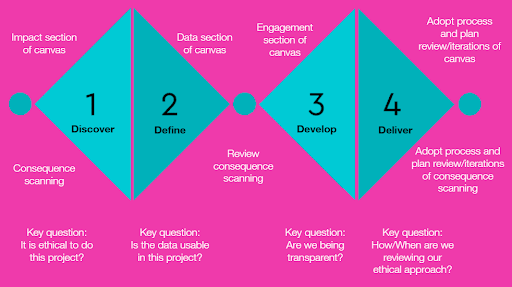
At the Open Data Institute (ODI), we define data ethics as:
a branch of ethics that considers the impact of data practices on people, society and the environment
During any data project or initiative there are likely to be different social, environmental or economic factors that can influence the need to evaluate the ethics of your data practices.
As these factors change over time, you may need to regularly review and adapt your approach. With this in mind, evaluating your approach to data ethics should not just be a tick-box exercise at the beginning of your project, but something productive to reflect back on at regular intervals.
Much of the work that we do at the ODI follows the ‘double diamond’ approach; a way of breaking project and product delivery down into four distinct phases:
- Discover – Identifying through research the challenge and underlying user needs that your project hopes to address.
- Define – Analysing the findings to understand how the user needs and the problem align.
- Develop – Exploring a number of potential solutions, which are then tested with users in order to refine them.
- Deliver – Settling on the most appropriate solution for the problem and developing it ready for publication or launch.
Using the ‘double diamond’ approach as a guide, we have been thinking about the points during delivery when sections of our Data Ethics Canvas, and Doteveryone’s Consequence Scanning toolkit, could be reviewed and improved.
A working depiction of the tools mapped against the ‘double diamond’

Discover
Key question: Is it ethical to do this project?
At the beginning of any project which has a focus on access, use or sharing data, it is important to establish what kind of impact you hope to create, and why data plays an important role. The ‘explore’ section of the Data Ethics Canvas can help you plot out and review:
- your reason for using data
- potential positive impacts on people
- potential negative impacts on people
- ways that you might mitigate the negative impacts.
At this stage the Consequence Scanning toolkit can also help you consider the questions you might want to ask about the consequences of your work; and can also prompt you to consider the unintended consequences of what you might do with data.
You should complete the ‘explore’ section of the canvas at the start of the project and then revisit it during your ‘discover’ phase.
Define
Key question: Is the data usable in this project?
For the ‘define’ phase of your project, you will need to think about what data you have access to and how it will be used to create your intended impact. Here, the ‘know’ section of the Data Ethics Canvas can help you to review and document your:
- available data sources
- rights to the data
- limitations in the data
- understanding of the ethical and legislative context.
You should complete the ‘know’ section of the canvas at the start of the project and then revisit it during your ‘define’ phase. You should also review the consequence scanning results at the end of this phase, to check if the data has revealed any additional concerns that might need to be considered around the impact of your project.
Develop
Key question: Are we being transparent?
As you begin to identify and develop solutions to address the problem identified, it is important to engage with those who may be affected by the outcomes of your project. This could be users of a product or tool, but it could also be people who are represented in the data that you plan to provide access to, or use, as part of your solution. The ‘plan’ section of the Data Ethics Canvas can help you to consider and review your approach to:
- engaging with people
- communicating your purpose
- openness and transparency
- sharing data with others.
You should complete the ‘plan’ section of the canvas at the start of the project and then revisit it during your ‘develop’ phase.
Deliver
Key question: How and when are we reviewing our ethical approach?
At regular intervals through the project, look back at your Data Ethics Canvas and use the ‘integrate’ section to consider the following:
- How can I check that data ethics are considered properly throughout the project lifecycle?
- What do I need to re-evaluate and how often?
- What actions and decisions do I need to take forward?
Try to add to this section every time you review your work on the canvas, so that the decisions are actioned at the appropriate time in the project.
You should also review this at the end of the project, to check that decisions captured during the process have been actioned. This may also be a good time to reflect on and add to the consequence scanning results.
Get involved
If you would learn more about utilising the Data Ethics Canvas in projects, sign up for our on-demand webinar. You can also find out more about our work on embedding data ethics in your organisation.